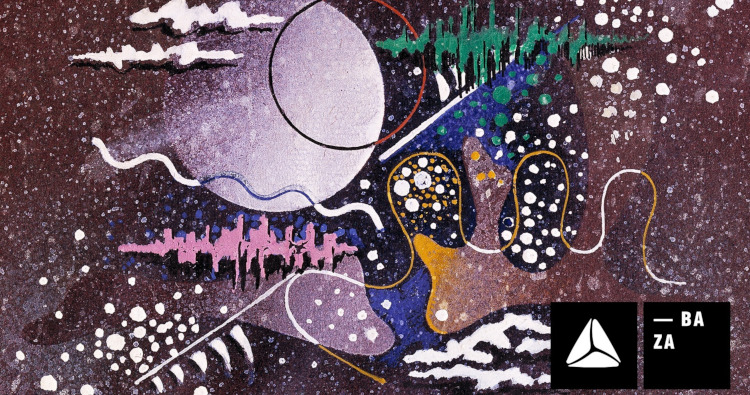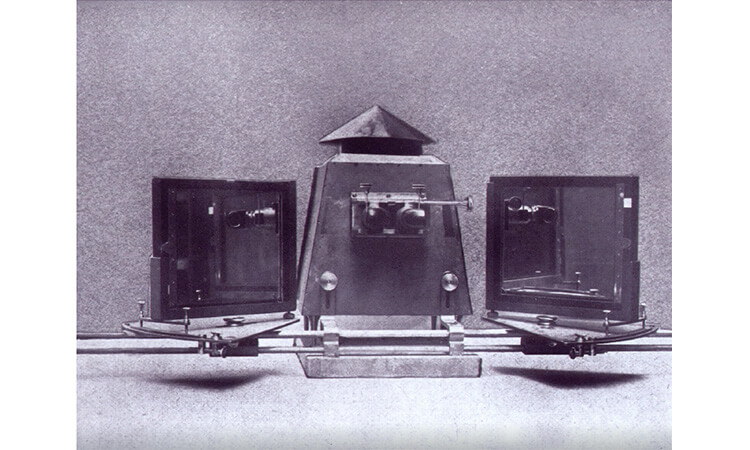Pioneering artist, researcher David Kakabadze celebrated in Tbilisi exhibition

The display of the Kakabadze archive is held in cooperation between the David Kakabadze Foundation and BAZA, a new multidisciplinary platform dedicated to knowledge-sharing in fields of contemporary art, science and research. Photo via exhibition organisers.
The rich legacy and historical impact of Georgian artist, researcher, inventor and scientist David Kakabadze is subject of an ongoing display in Tbilisi, where material on everything from his research on Georgian ornament details to his pioneering work on a glassless stereo cinematograph is shown.
Combining a swathe of documents, sketches, photographs and other exhibits, the exhibition presents an archive on Kakabadze, a major figure of the early 20th century Georgian modernist art scene who was also recognised beyond the country's borders for his work on technological inventions.
The daily display was opened last week and is organised by the David Kakabadze Foundation - itself established earlier this year to promote the artist's legacy - and BAZA, an interdisciplinary platform launched by TBC Bank to "promote knowledge sharing from the fields of contemporary art, science and research".
Exhibits curated for the event by Nina Akhvlediani have been drawn from family archive and include Kakabadze's work on the origins of Georgian ornamental art, documentation on a stereo cinematograph project he worked on in the 1920s and his sketches for an early design of Soviet heraldry.

The Google Arts and Culture platform features an entry on Kakabadze, centred around his invention of glassless stereo cinematograph. Photo: Art Palace.
Presenting an academic view of the life and international impact of Kakabadze, a talk by art historian Ketevan Kintsurashvili opened the exhibition at 18, Shota Rustaveli Avenue. Kintsurashvili spoke about the creative's works exhibited at the 1926 International Exhibition of Modernist Art at the Brooklyn Museum. The works are now part of a collection at the Yale University Art Gallery.
In addition to the display of archival exhibits, the ongoing exhibition also involved an unveiling of a first major digital archive of Kakabadze's work. Creators said the collection - created by a digitisation of exhibits from museums and theatres across Georgia - covered the body of his work "almost completely".
Launched to mark 130 years since the birth of the multidisciplinary creative and inventor, the exhibition follows other events held this year for the anniversary. Last month BAZA and the Kakabadze foundation held a two-day symposium dedicated to his legacy and involving artists as well as social and natural science professionals sharing ideas and knowledge at the intersection of their fields of work.
Earlier in the year Tbilisi’s TBC Gallery hosted an exhibition David Kakabadze — The Creative that put on display his works in an effort to highlight his lifelong inspiration connecting the worlds of art and science.

A display of works by Kakabadze, a major figure of Georgia's 20th century avant-garde art. Photo via David Kakabadze Foundation.
Finally, a digital display on Kakabadze was this year added to the Google Arts and Culture, a large online platform bringing together museum collections and biographies of notable people from history.
Kakabadze’s 1920s work on the cinematograph earned him a spot within Once Upon a Try, an online exposition celebrating inventions and achievements by personalities including aviator Amelia Earhart, scientist Nikola Tesla and astronomer Isaac Newton.
The artist and inventor's page on the platform is dedicated to his experimental work at crossroads of art and cinema, particularly on the device he developed circa 1922 and patented in eight countries across Europe and beyond.
The biographical notes on the page also mention the later fate of Kakabadze's work and a denial of their authorship to him by Soviet authorities, as a perceived payback for his “freedom of creativity”.
Created for the Google platform by a work group from Tbilisi's Art Palace museum, the entry ends with a reference on the avant-garde creative and inventor's death on May 10, 1952, as he was "forgotten and separated from the Western world [by political censorship]".
The exhibition of the Kakabadze archive will run at the Tbilisi location through January 15.
 Tweet
Tweet  Share
Share